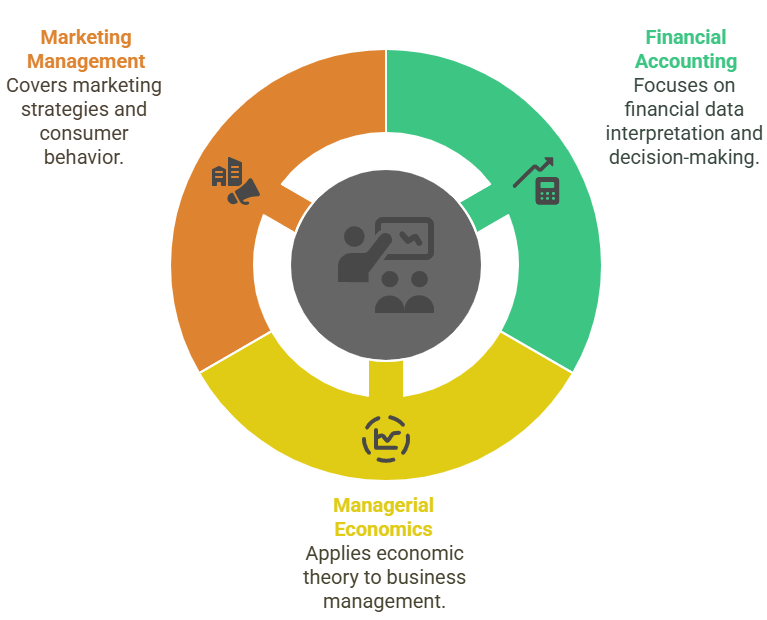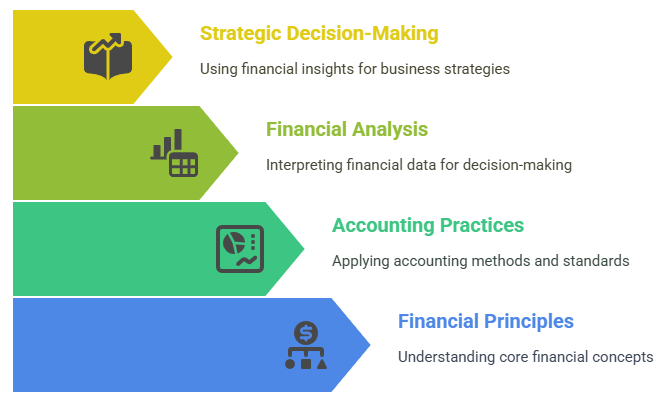
- Introduction to MBA Curriculum
- Core MBA Subjects (First Year)
- Specialization Electives Overview
- Marketing Management Subjects
- Finance and Accounting Subjects
- Human Resources Management Subjects
- Operations Management Subjects
- Information Technology Management
Introduction to MBA Curriculum
The MBA (Master of Business Administration) curriculum is designed to provide students with a comprehensive understanding of business principles, leadership strategies, and managerial skills essential for success in today’s competitive global marketplace. Typically spanning core disciplines such as finance, marketing, operations, human resources, economics, and strategy, the curriculum balances theoretical knowledge with practical application. Early in the program, students are introduced to foundational courses that build analytical and decision-making capabilities, followed by electives and specializations tailored to individual career goals. Many programs also include case studies, group projects, internships, and capstone experiences to foster real-world problem-solving and collaboration. Leadership development, ethical business practices, and global perspectives are often emphasized throughout the coursework, preparing graduates to navigate complex business environments effectively. Whether pursuing roles in consulting, entrepreneurship, corporate management, or nonprofit leadership, MBA students gain a robust toolkit that enhances critical thinking, communication, and strategic planning. Additionally, many programs incorporate emerging topics like digital transformation, sustainability, PMP training and data analytics to ensure relevance in a rapidly evolving business landscape. Ultimately, the MBA curriculum is structured to mold versatile, forward thinking professionals equipped to lead and innovate across diverse industries and functions.
To Explore PMP in Depth, Check Out Our Comprehensive PMP Certification Training To Gain Insights From Our Experts!
Core MBA Subjects (First Year)
- Financial Accounting: Introduces students to the principles of accounting, financial statements, and how to interpret financial data to make informed business decisions.
- Managerial Economics: Focuses on the application of economic theory to business management, helping students understand market behavior, pricing strategies, and decision-making processes.
- Marketing Management: Covers the essential concepts of marketing, including market analysis, consumer behavior, product development, and branding, enabling students to design effective marketing strategies.
The first year of an MBA program typically focuses on building a solid foundation of essential business knowledge. Core MBA subjects introduce students to the fundamental concepts that are crucial for managerial and leadership roles across various industries. These subjects emphasize practical skills and theoretical frameworks that equip students to handle the challenges of today’s dynamic business environment.

- Organizational Behavior: Examines the impact of individual and group behavior within organizations, exploring leadership, motivation, team dynamics, and corporate culture, while also providing an Overview of Retail Management to understand how customer experience, merchandising, store operations, and sales strategies shape business performance.
- Operations Management: Teaches students how to manage and optimize business operations, including supply chain management, production processes, and quality control.
- Business Ethics & Corporate Governance: Focuses on the ethical challenges in business and the importance of governance frameworks, corporate social responsibility, and sustainable practices in modern organizations.
Specialization Electives Overview
Specialization electives in an MBA program offer students the opportunity to tailor their education to specific areas of interest, enabling them to gain in-depth knowledge and expertise in a chosen field. These electives typically follow the core curriculum and allow students to focus on subjects that align with their career goals, whether they aim to advance in a particular industry or take on a specialized managerial role. Popular specializations include finance, marketing, human resources, operations, entrepreneurship, strategy, and business analytics. Each specialization provides a deeper exploration of topics such as financial modeling, digital marketing strategies, organizational development, supply chain optimization, and innovative business solutions. By selecting electives, students can refine their skills, build industry-specific expertise, and gain a competitive edge in their job search. Furthermore, electives often include case studies, group projects, and internships, providing real-world applications of the concepts learned in class. This flexibility allows students to not only broaden their career prospects but also cultivate leadership capabilities suited to their chosen specialization. Ultimately, specialization electives empower MBA students to align their academic journey with their professional aspirations, preparing them for leadership roles in diverse industries and sectors. In addition, understanding What Is Leadership and Its Importances becomes crucial leadership involves guiding, influencing, and inspiring individuals or teams toward achieving shared goals, and its importance lies in driving organizational growth, fostering strong workplace culture, improving decision-making, and motivating people to perform at their best.
Marketing Management Subjects
- Consumer Behavior: Focuses on understanding how consumers make purchasing decisions, the psychological and sociological factors that influence them, and how businesses can tailor their marketing efforts to meet consumer needs, while also connecting with broader organizational concepts such as What is Human Resource Management which plays a key role in aligning people, processes, and performance to support overall business strategy.
- Marketing Research: Teaches students the methods and tools needed to gather, analyze, and interpret data to make informed marketing decisions, including qualitative and quantitative research techniques.
- Brand Management: Explores the strategies involved in creating, developing, and maintaining strong brands, covering topics such as brand equity, positioning, and brand loyalty.
Marketing Management subjects in an MBA program are designed to provide students with a comprehensive understanding of how businesses develop and implement effective marketing strategies to reach their target audience. These subjects delve into both the strategic and tactical aspects of marketing, emphasizing customer behavior, market research, branding, and digital marketing techniques. With the ever-changing business landscape, students learn to adapt traditional marketing methods to modern challenges and technological advancements, preparing them to excel in the dynamic field of marketing.
- Digital Marketing: Examines the use of online channels like social media, search engines, and email to reach and engage with customers, including strategies for SEO, content marketing, and online advertising.
- Marketing Strategy: Focuses on the development and execution of long-term marketing plans, considering market segmentation, competitive analysis, and value proposition creation.
- Sales and Distribution Management: Covers the management of sales teams, sales strategies, and distribution channels to ensure products and services reach the right customers efficiently and effectively.
- Organizational Behavior: Explores the impact of individual and group behavior within organizations, helping students understand how to foster effective teamwork, motivate employees, and lead organizational change.
- Recruitment and Selection: Teaches the methods and strategies for attracting, selecting, and hiring the right talent, focusing on job analysis, interviewing techniques, and selection criteria, while also linking these hiring decisions to broader organizational insights like Tools and Techniques in Management Accounting which help businesses plan, measure, and manage performance more effectively.
- Training and Development: Focuses on designing and implementing training programs that enhance employees’ skills and capabilities while supporting their career development and organizational growth.
- Compensation and Benefits: Examines compensation strategies, including salary structures, bonuses, and benefits packages, and how these influence employee motivation and retention.
- Labor Relations and Employment Law: Covers the legal aspects of HR, including labor laws, employment contracts, dispute resolution, and compliance with regulations affecting the workplace.
- Performance Management: Teaches students how to design and implement performance appraisal systems, set employee objectives, and provide feedback to foster high performance and employee growth.
Are You Considering Pursuing a Master’s Degree in PMP? Enroll in the PMP Masters Program Training Course Today!
Finance and Accounting Subjects
Finance and Accounting subjects in an MBA program are crucial for developing the financial acumen necessary to make strategic business decisions. These subjects provide students with a solid understanding of financial principles, accounting practices, and how financial information is used to assess business performance, manage risks, and guide decision-making processes. Students learn to interpret financial statements, analyze balance sheets, and understand cash flow management to ensure a company’s financial health. Key areas such as corporate finance, investment analysis, financial planning, and budgeting are explored to help students understand the complexities of managing a business’s financial resources. PMP training also aligns strongly with these areas, as it enhances project-based financial planning and resource management skills, which are essential in executing large-scale business initiatives. Additionally, accounting subjects cover topics like cost accounting, financial reporting, taxation, and auditing, providing a comprehensive foundation for managing both day-to-day financial operations and long-term financial strategy. Finance and accounting are integral to ensuring profitability, making these subjects essential for anyone aiming to pursue senior management roles, whether in finance, consulting, or other business sectors. Through case studies, financial modeling, and real-world applications, students gain practical experience in analyzing financial scenarios, making informed decisions, and developing strategies that maximize value and minimize risk. These subjects equip MBA students with the skills necessary to manage a company’s finances efficiently and lead it towards sustainable growth.

Human Resources Management Subjects
Human Resources Management (HRM) subjects in an MBA program are designed to provide students with the skills and knowledge needed to effectively manage an organization’s most valuable asset: its people. These subjects cover a wide range of topics related to recruiting, developing, and retaining talent, as well as creating a positive work culture. By focusing on strategic HR practices, students learn how to align human resource management with organizational goals, ensuring both employee satisfaction and business success.
Are You Interested in Learning More About PMP? Sign Up For Our PMP Certification Training Today!
Operations Management Subjects
Operations Management subjects in an MBA program are designed to provide students with a comprehensive understanding of how to efficiently manage the production and delivery of goods and services. These subjects focus on optimizing business processes, reducing costs, and ensuring the smooth flow of operations from procurement to final delivery. Students explore key concepts such as supply chain management, quality control, inventory management, and process improvement, which are essential for enhancing organizational efficiency. Operations Management courses also delve into topics like lean management, capacity planning, and demand forecasting, helping students develop the skills needed to balance supply and demand effectively. Additionally, students learn how to implement strategic decision-making to drive operational excellence while maintaining high standards of customer satisfaction. By utilizing tools like Six Sigma, Total Quality Management (TQM), and just-in-time (JIT) systems, students gain practical knowledge to solve real-world operational challenges. The focus on both global and local perspectives prepares students for managing operations across diverse industries, from manufacturing to service-based organizations. Ultimately, Operations Management subjects provide MBA students with the expertise to improve operational workflows, reduce waste, and create value, ensuring organizations remain competitive and agile in a constantly evolving business environment. This understanding also connects to broader managerial decision-making areas such as Nature Of Managerial Economics Importance which helps managers analyze business situations, allocate resources efficiently, and make informed strategic choices.
Are You Preparing for PMP Jobs? Check Out ACTE’s Project Management Interview Questions & Answer to Boost Your Preparation!
Information Technology Management
Information Technology (IT) Management in an MBA program focuses on leveraging technology to drive business growth, innovation, and efficiency. As businesses increasingly rely on digital tools and systems to streamline operations, IT management becomes crucial for aligning technology with organizational goals. This subject teaches students how to manage the entire lifecycle of IT resources, from infrastructure to software applications, ensuring that technology investments deliver value. Students explore topics like IT strategy, project management, cybersecurity, cloud computing, data management, and enterprise resource planning (ERP) systems. PMP training is also closely linked to this domain, as it strengthens project execution skills essential for handling complex IT initiatives. Additionally, the course emphasizes the importance of digital transformation in organizations, helping students understand how to integrate emerging technologies like artificial intelligence, blockchain, and big data analytics into business processes. IT management also focuses on ensuring that technology supports business objectives, improves decision-making, and enhances customer experience. By learning to manage IT teams, budgets, and projects, students are equipped to oversee technology implementation, maintenance, and innovation across sectors such as finance, healthcare, and manufacturing. The ability to effectively manage IT resources and align them with business strategies is critical for maintaining a competitive edge in today’s fast-paced digital economy, making IT Management an essential area of focus for future business leaders.

